Related Research Articles

Thomas Michael Keneally, AO is an Australian novelist, playwright, essayist, and actor. He is best known for his non-fiction novel Schindler's Ark, the story of Oskar Schindler's rescue of Jews during the Holocaust, which won the Booker Prize in 1982. The book would later be adapted into Steven Spielberg's 1993 film Schindler's List, which won seven Academy Awards, including Best Picture.

Sapardi Djoko Damono was an Indonesian poet known for lyrical poems, and who was widely regarded as the pioneer of lyrical poetry in Indonesia. He died in South Tangerang, Banten on 19 July 2020 after a long illness.

Pramoedya Ananta Toer, also nicknamed Pram, was an Indonesian novelist and writer. His works span the colonial period under Dutch rule, Indonesia's struggle for independence, its occupation by Japan during the Second World War, as well as the post-colonial authoritarian regimes of Sukarno and Suharto, and are infused with personal and national history.
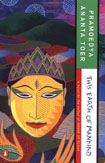
This Earth of Mankind is the first book in Pramoedya Ananta Toer's epic quartet called Buru Quartet, first published by Hasta Mitra in 1980. The story is set at the end of the Dutch colonial rule and was written while Pramoedya was imprisoned on the political island prison of Buru in eastern Indonesia. The story was first narrated verbally to Pramoedya's fellow prisoners in 1973 because he did not get permission to write. The story spread through all the inmates until 1975 when Pramoedya was finally granted permission to write the detailed story.
Cipinang Penitentiary Institution is a top-security prison in Jakarta, Indonesia. It is exactly located in Cipinang Muara, Jatinegara, East Jakarta.
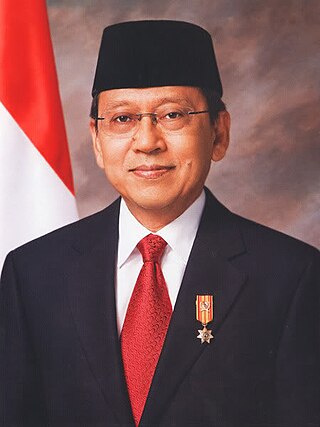
Boediono is an Indonesian politician and economist. He was the 11th vice president of Indonesia, in office from 2009 to 2014. He became vice president after winning the 2009 presidential election together with the then-incumbent President Susilo Bambang Yudhoyono. Before this, he had been the Governor of the Indonesian Central Bank and a professor of economics at Gadjah Mada University.
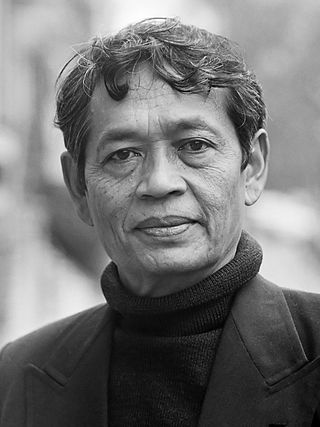
Mochtar Lubis was an Indonesian journalist and novelist who co-founded Indonesia Raya and monthly literary magazine Horison. His novel Senja di Jakarta was the first Indonesian novel to be translated into English. He was a critic of Sukarno and was imprisoned by him, as well as by Suharto on several later occasions. He held strong anti-leftist views and was seen by critics as aligned with military and pro-US forces that were opposed to Sukarno’s non-aligned policies, a charge that he himself denied.

Teguh Karya was an Indonesian film director. Starting his entertainment career in theatre, he made his directorial debut in 1971 with Wadjah Seorang Laki-Laki in which he also wrote the screenplay. He later directed numerous critically acclaimed films, including Cinta Pertama, Badai Pasti Berlalu, and November 1828. In 2001, Karya died from complications from a 1998 stroke.

Hans Bague Jassin, better known as HB Jassin, was an Indonesian literary critic, documentarian, and professor. Born in Gorontalo to a bibliophilic petroleum company employee, Jassin began reading while still in elementary school, later writing published reviews before finishing high school. After a while working in the Gorontalo regent's office, he moved to Jakarta where he worked at the state publisher Balai Pustaka. After leaving the publisher, he attended the University of Indonesia and later Yale. Returning to Indonesia to be a teacher, he also headed Sastra magazine. Horison, a literary magazine, was started in July 1966 by Jassin and Mochtar Lubis as a successor to Sastra, and was edited by Taufiq Ismail, Ds. Muljanto, Zaini, Su Hok Djin, and Goenawan Mohamad. In 1971, Jassin was given a one-year prison sentence and a two-year probation period because as the editor of Sastra, he refused to reveal the identity of an anonymous writer who wrote a story which was considered by the court to be blasphemous.
Jeruk Purut is a cemetery in Jakarta, Indonesia.

Ucu Agustin is an Indonesian journalist, writer, and documentary filmmaker.
John H. McGlynn is an American editor and translator.
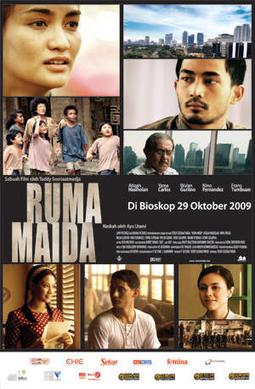
Ruma Maida is a 2009 Indonesian film written by Ayu Utami, directed by Teddy Soeriaatmadja and starring Atiqah Hasiholan, Yama Carlos, Nino Fernandez, and Frans Tumbuan. It details a woman's struggle to save a historic house from a developer; it also shows the life of the house's original owner.

Tirto Adhi Soerjo was an Indonesian journalist known for his sharp criticism of the Dutch colonial government. Born to a noble Javanese family in Blora, Central Java, Tirto first studied to become a doctor but later focused on journalism. A freelancer since 1894, in 1902 he was made an editor of the Batavia based Pembrita Betawi. Tirto established his first newspaper in 1903 and, four years later, created Medan Prijaji as a medium for educated native Indonesians. This proved his longest-lived publication, lasting over five years before Tirto was exiled in 1912 to Bacan for his staunch anti-colonial criticism.

Erwin Arnada is an Indonesian journalist and filmmaker. Born to a devout Muslim family in Jakarta, Arnada became interested in journalism in 1984, and, after a time as a photographer, he interned at the weekly Editor. Beginning in 1990 he took editorial roles in various print media, including the controversial tabloid Monitor. Arnada entered cinema in 2000, producing several films for Rexinema.

Asmara Moerni is a 1941 romance film from the Dutch East Indies directed by Rd Ariffien and produced by Ang Hock Liem for Union Films. Written by Saeroen, the film followed a doctor who falls in love with his maid, as well as her failed romance with a fellow villager. Starring Adnan Kapau Gani, Djoewariah, and S. Joesoef, the black-and-white film was cast and advertised to cater to the growing native intelligentsia. Despite mixed reviews, it was a commercial success. As with most films of the Indies, Asmara Moerni may be lost.
Censorship in Indonesia has varied since the country declared its independence in 1945. For most of its history the government of Indonesia has not fully allowed free speech and has censored Western movies, books,films, and music as well. However, partly due to the weakness of the state and cultural factors, it has never been a country with full censorship where no critical voices were able to be printed or voiced.
Isak is a surname. Notable people with the name include:

Burhanuddin Mohammad Diah, born only as Burhanuddin, was an Indonesian journalist, diplomat, and businessman, who served as the 18th Indonesian Minister of Information from 1966 until 1968, under the presidencies of Sukarno and Suharto, during the transition to the New Order. He was present at the time of the Proclamation of Independence was being formulated, and was a figure who played an important role in saving the original text of the Proclamation.
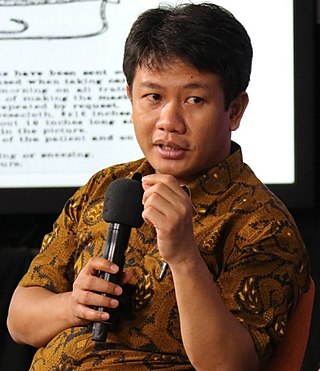
Bonnie Triyana is an Indonesian historian, politician, and museum curator. He founded the Indonesian-language history magazine Historia and is its director and editor-in-chief.